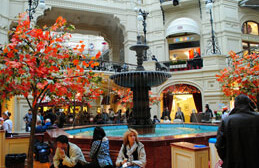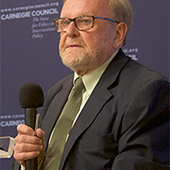Flouting the Economic Laws of Nature?
Barely one month into his third term as Russia's president, Western Moscow watchers have been avidly reading the tea leaves of Vladimir Putin's early actions and policy signals. High on the list of speculations is the matter of Russia's economy—its current state and likely future trajectory.
Here, the president's moves to date have been, as an analysis in the Financial Times of May 31, 2012 suggested, "symptomatic of the fraught balancing act Mr. Putin must perform." As the FT article points out, Putin's economic advisors cover a broad spectrum, from cabinet "liberals," such as Igor Shuvalov and Arkady Dvorkovich, to the "hawkish energy tsar," Igor Sechin.
Putin himself, of course, is the man the West and the West-leaning Russian opposition love to hate and, in that spirit, his three-week record on economic performance and projection has already come under fire. At the center of the bull's-eye for the attacks have been the measures of "modernization" and growth the president has ordered the government to attain. These include:
- To create 25 million high-productivity jobs by 2020
- To increase investment to at least 25 percent of GDP by 2015
- To boost labor productivity to a level one-and-a-half times greater than that of 2011
- To lift Russia's position in the World Bank's Doing Business Index from 120th in 2011 to 50th in 2015 and 20th in 2018
- To raise average life expectancy by 2018 to 74 years from the current 70
These admittedly ambitious—to say the least—goals have provided a field day for Putin's opponents among economic think tanks in Russia: "flouting the laws of nature and economic development," was one assessment (one is perhaps more inclined to accept their views on the "laws" of economic development than those of "nature," but we'll let that pass); "reminiscent of China's Great Leap Forward" was >another.
It would be foolish to ignore the clouds that hang over Russia's economy. To name but three: the long haul to modernization; the prolonged and debilitating net capital outflow from the country—$84 billion in 2011 and $35 billion in the first quarter of 1012; and the vulnerability to external shocks, such as the Eurozone crisis which, inter alia, limits Russia's revenues from petroleum sales.
Let us, however, look at some of the positive portents. First, even one of the Cassandra-like opinion pieces noted that "Russia is looking with a degree of superiority on the crisis engulfing the debt-ridden Eurozone states, predicting only a narrow budget deficit of just 0.3 percent of GDP this year and buoyed by robust first quarter growth . . . of 4.9 percent." [with 4.3 percent rise in gross domestic product].
Second, Putin's track record is far from shabby; the country's economy enjoyed robust growth for most of his first two terms (2000-2008), but inevitably suffered in the global downturn of 2008-9, with GDP declining by 10 percent. ["Russia GDP Growth Rate," Trading Economies]
Third, we quote Dr. Nicolai Petro, professor of international politics at the University of Rhode Island, who served as special assistant for policy on the Soviet Union under President George H.W. Bush. Writing in the Asia Times on March 12, 2012, Dr. Petrov says:
"In 2011 [Russia] was the world's third-fastest growing major economy and ended the year with a budget surplus. It remains the world's leading oil and gas producer at a time when, thanks to tensions in the Middle East, prices show few signs of falling [NOTE: this observation has to an extent been overtaken by events, but the matter of longer-term price and supply stability still remains].
"Meanwhile, because Europe has chosen to dither on signing long-term energy contracts, Russia has diversified its supply routes and reoriented some of them to China. This not only improves the long-term balance of payments but solidifies a long-term strategic reorientation toward Asia, largely at Europe's expense. Analysts expect the total value of trade between these two giants to exceed $100 billion in 2012."
Fourth, Putin has also moved strategically to build regional partnerships. The Eurasian Economic Union, widely derided in the West, brought immediate, if limited, dividends in the form of two of Russia's neighbors-Belarus and Kazakhstan, and, as Dr. Petrov observes, with "even the perpetually ambivalent Ukrainians [saying] that it finds the concept interesting" [and having already signed on to the preliminary step to full membership, that of Customs Union]. As for the so-called BRICs (Brazil, Russia, India, China), Petrov points out that this is "no longer just a random assortment of states known for their high economic growth." Largely at Russia's initiative, these nations have begun to coordinate their foreign policies and promote multipolar global initiatives . . . to promote regional stability, and to challenge the Western-led model of modernization."
Fifth, Russia's accession to the World Trade Organization (WTO) this summer will allow it both to enjoy further dynamic development of the Moscow stock market (already the seventh largest in the world) and to seek legal means to end discriminatory practices against Russia's business and exports. (Here, may we make one last appeal for an end to the mind-numbingly anachronistic yet enduring Jackson-Vanik Amendment of the U.S. Congress, an egregious example of such practices, and one that may well find the United States in violation of WTO obligations.)
Sixth, as reported in The Moscow Times, the Foreign Investment Advisory Council, a body of global CEOs and government economic ministers, which endorsed Putin for the presidency in 2012, in an emailed statement, "support[s] the continuity in Russia's economic policy." Among the companies represented on the Council is PepsiCo, whose former CEO and cofounder, Donald Mackintosh Kendall, has said:
"I have been involved with business in the Soviet Union and Russia since 1959, and Putin has provided the best leadership the country has ever had. PepsiCo is very happy to have Russia as its biggest international market. It is planning to put $1 billion into Russia over the next two years, bringing a ten-year total to $10 billion."
Finally, back for a moment to the "laws of nature." To those skeptics who choose even to challenge the life expectancy aspirations in Putin's agenda for socioeconomic progress—from the current 70 to 74 in the coming decade—we would ask: Would you prefer to go back from the lifespan of 70 years attained under Putin, to the Yeltsin era, where life expectancy for men plummeted to 57, with ominous implications for Russia's economic, social, and even military prospects?
To quote from an earlier piece in these columns, "For Putin redux, time will tell." Nowhere is this more true in his performance and delivery where Russia's economy is concerned. May we at least wait a year or so to judge what time has told us?
Carnegie Council provides an open forum for discussion of ethical issues in international affairs. For another view of President Putin's Russia, see Elections Without Change.




